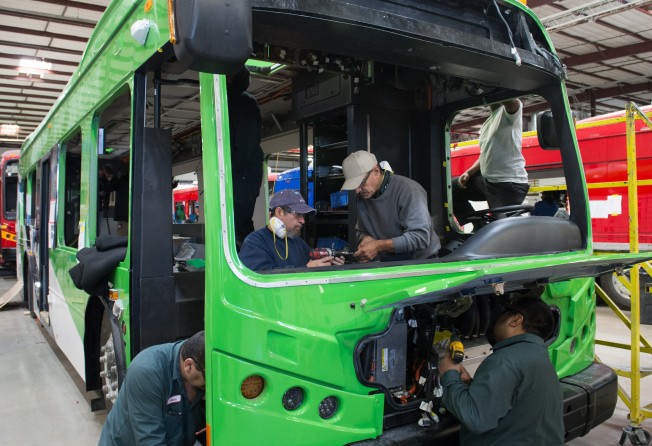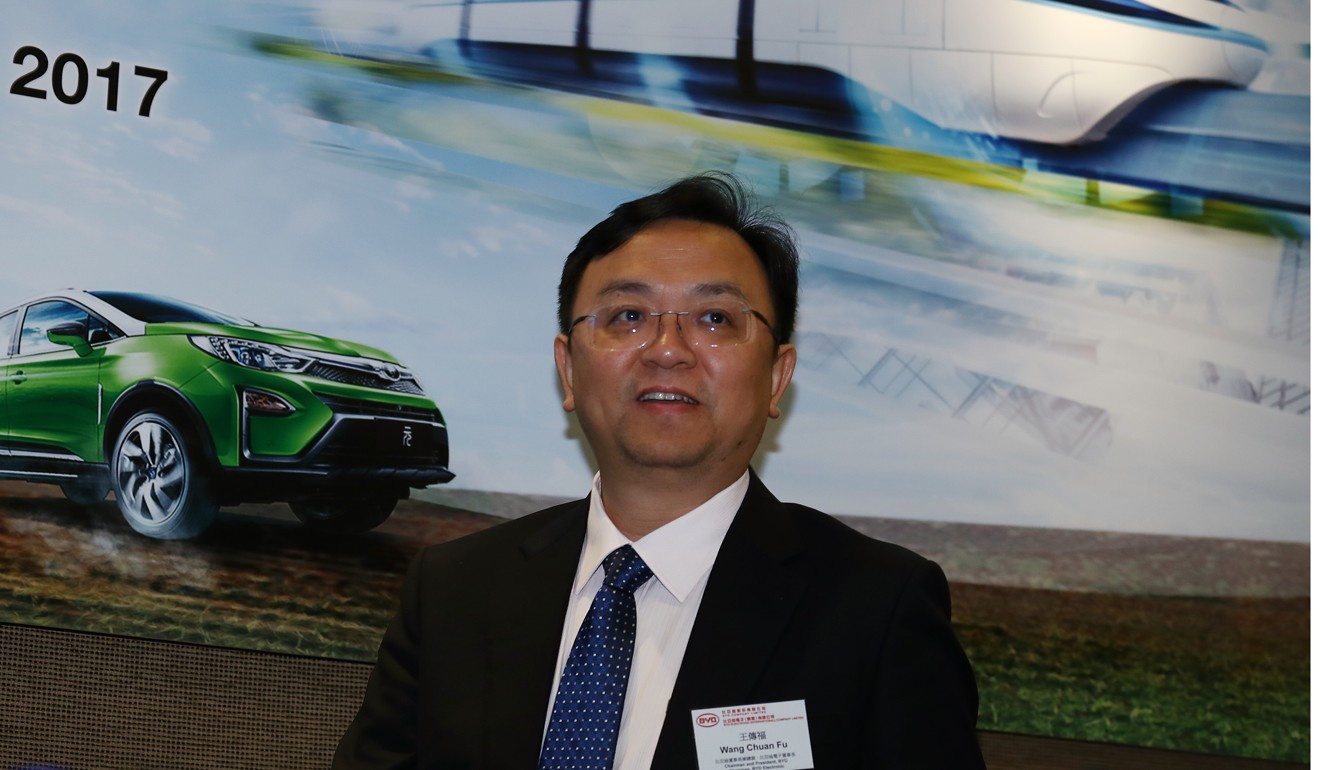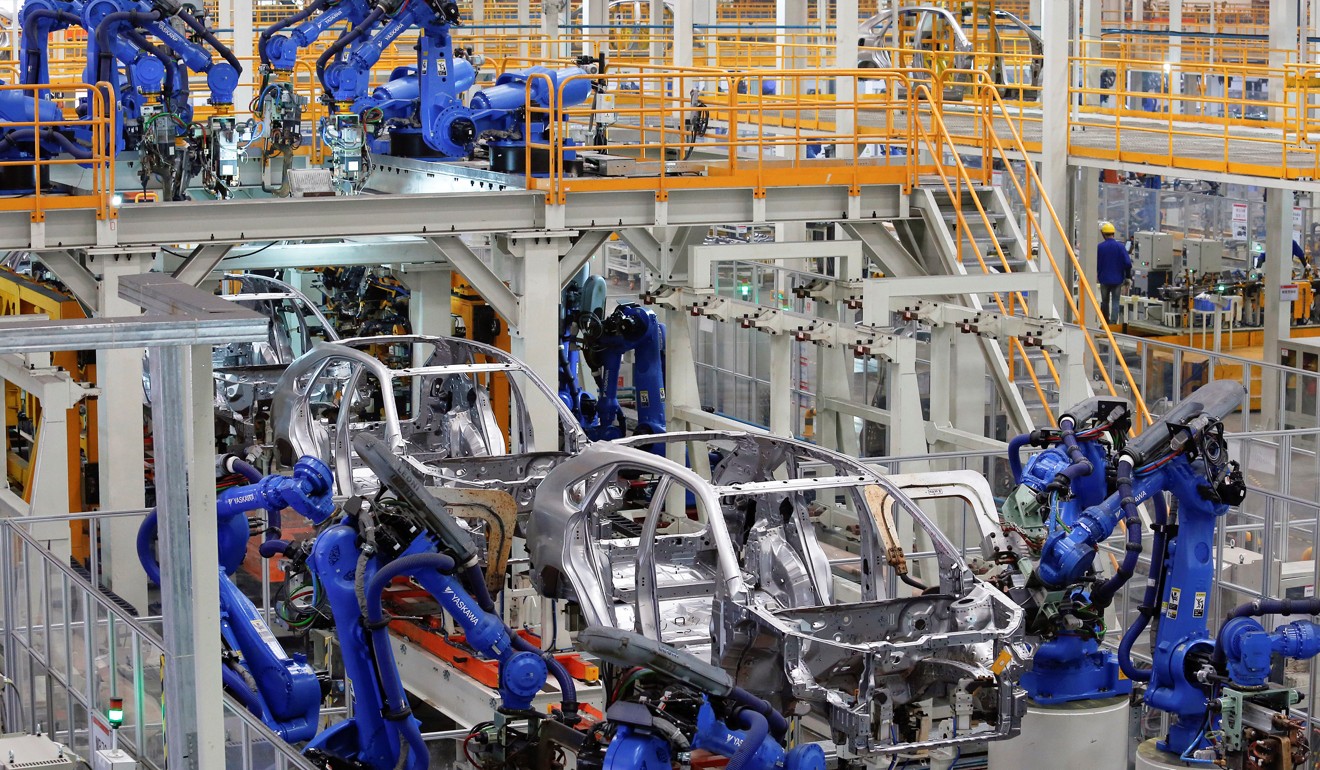Buffett-backed carmaker banks on North America’s zero-emission push to sell more electric buses
The expansion will boost US operations revenue to US$1 billion in 3 to 5 years. BYD is 8 per cent owned by Warren Buffett’s Berkshire Hathaway

China’s biggest maker of electric vehicles is taking advantage of zero-emission fleet initiatives in North America to grow in the region and become more competitive globally.
Demand for fully electric trucks and buses in the US and Canada represent not only an opportunity worth billions of dollars in revenue, but the standards BYD needs to achieve in these markets will help the manufacturer globalise, company officials including chairman Wang Chuanfu said in interviews with the South China Morning Post.
“We want to produce in accordance with American requirements and American consumer demands in mind,” Wang said. “American standards are higher than what you have in China and there’s more diversity in terms of requirements when it comes to electric vehicles.”
Some municipalities in the two countries have established zero-emission transit programmes, one of the biggest factors driving the market. Many major transit authorities are at least switching portions of their fleets to electric.
“Every country is undergoing urbanisation, which is causing headaches in the form of traffic jams and pollution. Step-by-step, every city, every country will need our technology,” said Stella Li, president of BYD America. “This is how we expect to expand overseas very rapidly.”
Vehicles that operate in California must follow emission standards set by the California Air Resources Board and those set by the federal-level Environmental Protection Agency (EPA). EPA limits on greenhouse gas emissions from vehicles, which were voluntary after they were announced in 2011, became mandatory this year.

BYD, eight per cent owned by Warren Buffett’s Berkshire Hathaway, officially opened a new manufacturing facility in southern California that has more than tripled its production of zero-emission, electric-powered buses. That expansion will allow its US operations to increase its revenue to US$1 billion in the next three to five years, from the US$150 million to US$200 million expected for this year, Li said.
Every country is undergoing urbanisation, which is causing headaches in the form of traffic jams and pollution. Step-by-step, every city, every country will need our technology
In the US, BYD’s customers included the Los Angeles Department of Transportation, Stanford University, Denver Regional Transportation District and the Kansas City International Airport. The Antelope Valley Transit Authority, which services an area that includes BYD America’s home base, and the City of Albuquerque have committed to fully electric bus services using BYD models.
BYD has delivered about 140 buses made at its Lancaster, California facility since it opened in 2011. The company is currently working on a 300-bus back order and has options for more than 300 additional purchases.
Although the Chinese vehicle maker competes with New Flyer of America, another US-based maker of electric transit buses for orders, Li said she did not consider her company to have any direct competitors because BYD is solely focused on fully electric models.
New Flyer, the largest US bus manufacturer, and Gillig Corporation, another US bus manufacturer that ranked just behind New Flyer in terms of sales, both produce hybrid-diesel models.
Li said BYD’s singular focus on zero-emission models would make them increasingly competitive as more municipalities follow the lead of Albuquerque and the Antelope Valley.
Meanwhile, government incentives in Canada presented an opportunity worth more than C$1 billion in the next five years in that country, said Ted Dowling, BYD’s Vancouver-based regional vice-president, who oversees markets including the Pacific Northwest and Canada.

“We understand Canadians’ concerns about the environment and are developing an aggressive strategy to tackle climate change by taking actions to reduce greenhouse gases and air pollution,” Canada’s Transport Minister Marc Garneau said at an electric vehicle exhibition in Montreal this year.
“By putting more zero-emission vehicles on the road, we are investing in the future of cleaner transportation for all Canadians.”
“There’s a lot of movement going towards electric from diesel. A lot of the trucking and grocery delivery are looking at utilising the incentive programme to convert their fleets from diesel or gas to electric,” Dowling said.
They need to buy vehicles that don’t require as much maintenance and don’t require as much cost to operate and that’s where electric comes in
“If you look at the ageing fleet of trucks and buses in Canada, they haven’t had the replacements they need. Cities don’t have the service they require and they don’t have the people to take care of the buses. They need to buy vehicles that don’t require as much maintenance and don’t require as much cost to operate and that’s where electric comes in.”
BYD is close to announcing a 20-bus sale to a private tour operator in British Columbia and the opening of a facility in Ontario that will do final assembly on trucks to meet demand from customers there and fulfil local-content requirements, Dowling added.
BYD’s focus on bus and truck fleets means the company is forgoing, for the time being, a push into the North American consumer auto market, which is dominated primarily by Tesla models and Chevrolet’s all-electric Volt.
Having built momentum in the transit bus market, BYD is now focusing on trucks. The company recently bought 153 acres of land in Lancaster for a facility that will produce delivery, refuse removal and other varieties of truck.
“Winning bus orders is the first part of our strategy. The second part of our strategy is electric trucks. Once we’ve achieved the success we’re looking for in the first part, we’ll be expanding our truck strategy,” Wang said. “Whether we expand truck production in other parts of North America depends on the future development of orders.”
Wang added that BYD “doesn’t have a time frame” to begin producing electric cars in the US.